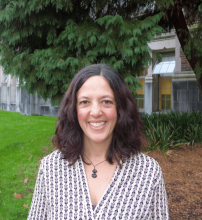For over a decade, Professor Ann Frost has been helping facilitate the Law, Societies, and Justice (LSJ) Book Club at the men's and women's correctional facilities in Washington State. Meeting monthly on the second Saturday morning of each month, the LSJ Book Club brings together six LSJ students, approximately seven inmates, and Professor Frost, who supervises discussions on a variety of books. Professor Frost’s career has been deeply intertwined with the criminal justice system. This dedication of hers to the Book Club and prisoner education stems from years of working with individuals charged with crimes as a public defender. After working as a public defender, she transitioned into academia where she began teaching about incarceration in the LSJ department.
Over the past ten years, the LSJ Book Club has flourished under Frost’s guidance. “It’s my favorite part of my job,” she shares. “It’s incredibly rewarding for people who really need it.” The club provides a space where participants, both students and inmates, engage in critical discussions, sharing perspectives that are able to transcend prison barriers. Many incarcerated individuals actively seek to join the club because they are drawn to the varied intellectual conversation and human connection it offers. For Frost, witnessing the comradery and humanity within these conversations is one of the most rewarding aspects of her job.
Despite its success, maintaining the Book Club has not been without obstacles. The COVID-19 pandemic forced the suspension of the club in the women’s prison, which has yet to be able to reintroduce the program due to barriers with volunteer coordinators and the Department of Corrections (DOC). The men’s Monroe Correctional Complex took nearly a year to reinstate meetings. And beyond pandemic-related disruptions, navigating hurdles with the DOC remains a persistent challenge. While the DOC claims a commitment to programming, individual staff members may not always share this perspective. Volunteers often face resentment from coordinators, scheduling conflicts, derogatory comments about inmates, and unnecessarily rigid institutional rules.
Throughout her years running the book club, Frost has encountered many deeply moving experiences. When the Book Club was still occurring at the women’s prison, one of the academic years of the LSJ Book Club’s operation all of the student volunteers happened to be women. During a regular meeting when inmates and students were discussing their book of the month, the female inmates expressed gratitude for the opportunity to engage in discussions with other women and how truly profound community within women can be. Another memory Professor Frost shared about the women’s prison is when her and her students were conducting their volunteer training tour and walked into a Powwow ceremony. An inmate asked Frost if she and her students would want to be smudged, but the DOC coordinator that was with them was skeptical and discouraged the group from participating. Frost shared, “I'm not going to go in there and not acknowledge their humanity,” and allowed for the ceremonial group to smudge her and the fellow LSJ Book Club members. At the men’s prison, a particular memory that stood out to Frost is when a man who struggled with reading finally found the courage to participate in discussions, overcoming his feelings of insecurity with what he believed he had to contribute to the group. Another male inmate who had received an infraction and was removed from the club, later wrote a heartfelt letter to Frost expressing how the book club was the only place where he ever felt heard.
Given her roles as a former public defender and book club organizer, Professor Frost has gained a profound understanding of incarceration. She shares that her conversations with inmates and her relationships built have reinforced her belief that the U.S. imprisons far too many individuals, particularly those serving extremely long sentences and those serving life sentences. She argues that such lengthy sentences often prove to be counterproductive. Many book club members have spent years behind bars, working towards clemency and rehabilitation, yet numerous prison programs remain inaccessible to those serving long-term sentences. Educational and social programs are often reserved for those who are getting out in a few years because they are thought to need it the most since they will be rejoining society outside of prison. Although this is with the intention of reducing recidivism rates, it leaves those serving long sentences in the shadows, unable to utilize these programs to improve their mental health, receive an education, and grow as a person beyond the mistake that led to them becoming incarcerated.
Looking ahead, Frost notes that while legislative efforts to reduce incarceration are crucial, society must not forget those currently imprisoned. With shifting political landscapes and administrations potentially slowing reform, it becomes even more vital to advocate for and sustain programs that provide social and educational growth for incarcerated individuals. By continuing the LSJ Book Club, Frost hopes to continue to foster this conversation between students and those that are incarcerated.
Story by Sydney Wayland
